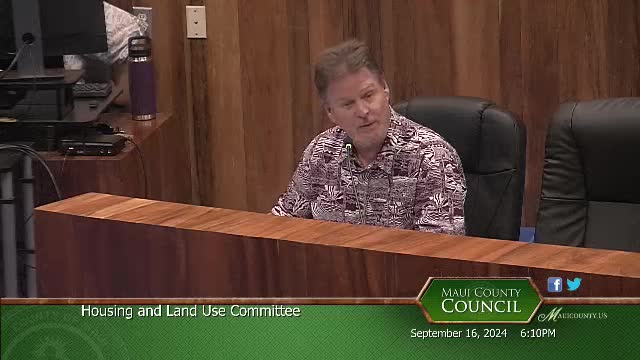Housing Crisis Deepens as Rent Control Backfires Worldwide
September 16, 2024 | Maui County, Hawaii
This article was created by AI summarizing key points discussed. AI makes mistakes, so for full details and context, please refer to the video of the full meeting. Please report any errors so we can fix them. Report an error »

During a recent government meeting, officials addressed the pressing global housing crisis, emphasizing that the issue extends beyond local concerns, such as those highlighted by the Lahaina fires. The discussion underscored a universal shortage of both rental and residential housing, affecting communities from New Zealand to Europe.
Key points raised included the ineffectiveness of rent control as a solution to the housing shortage. Citing studies from various U.S. cities, officials argued that rent control often leads to a decrease in available housing. For instance, cities like Cambridge and Brookline, Massachusetts, experienced an 8% and 12% drop in rental units, respectively, after implementing stringent rent controls. Similar trends were noted in Berkeley and Santa Monica, California, where rental supplies fell by 14% and 8% between 1978 and 1990.
The meeting highlighted that rent control can inadvertently contribute to gentrification and reduce the overall quantity of available housing. As landlords respond to rent control measures, they may convert rental units into condominiums or new constructions exempt from such regulations, further diminishing rental options for tenants.
Additionally, the administrative costs associated with rent control programs were discussed, with concerns that these expenses would ultimately fall on the county. The potential decline in property maintenance due to reduced rental income was also noted, which could lead to decreased property values and lower property tax revenues.
Officials concluded that while the intent behind rent control may be to protect tenants, the actual outcomes often contradict these goals, leading to a reduction in housing availability and increased financial strain on property owners. The meeting called for collaborative efforts between government and private sectors to explore more effective solutions to the housing crisis.
Key points raised included the ineffectiveness of rent control as a solution to the housing shortage. Citing studies from various U.S. cities, officials argued that rent control often leads to a decrease in available housing. For instance, cities like Cambridge and Brookline, Massachusetts, experienced an 8% and 12% drop in rental units, respectively, after implementing stringent rent controls. Similar trends were noted in Berkeley and Santa Monica, California, where rental supplies fell by 14% and 8% between 1978 and 1990.
The meeting highlighted that rent control can inadvertently contribute to gentrification and reduce the overall quantity of available housing. As landlords respond to rent control measures, they may convert rental units into condominiums or new constructions exempt from such regulations, further diminishing rental options for tenants.
Additionally, the administrative costs associated with rent control programs were discussed, with concerns that these expenses would ultimately fall on the county. The potential decline in property maintenance due to reduced rental income was also noted, which could lead to decreased property values and lower property tax revenues.
Officials concluded that while the intent behind rent control may be to protect tenants, the actual outcomes often contradict these goals, leading to a reduction in housing availability and increased financial strain on property owners. The meeting called for collaborative efforts between government and private sectors to explore more effective solutions to the housing crisis.
View full meeting
This article is based on a recent meeting—watch the full video and explore the complete transcript for deeper insights into the discussion.
View full meeting
